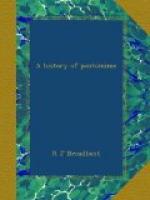A “Platt” of the “Seven Deadly Sinnes,” supposed to have been written by Dick Tarleton, the famous Clown, is preserved, I believe, in Dulwich College. It consists of a pasteboard fifteen inches high, and nine in breadth, and on it is written, in two columns, the following:—
“A tent being placed on the stage for Henry the Sixth; he in it asleep. To him the lieutenant, and a pursuivant (R. Cowley, Jo. Duke), and one warder (R. Pallant). To them Pride, Gluttony, Wrath, and Covetousness at one door; at another door Envy, Sloth, and Lechery. The three put back the four, and so exeunt.
“Henry awaking, enter a keeper (J. Sinclair), to him a servant (T. Belt), to him Lidgate and the keeper. Exit, then enter again—then Envy passeth over the stage. Lidgate speaks.”
These “Platts” were, in all probability, one of the first written forms of Pantomimic entertainments known in England, and borrowed, as mentioned, from the Scenarios of the Italians. That form of home amusement well-known in family circles, “Acting Charades,” may be likened to them.
To get all the information that we can obtain of the “Platts,” I am sure I cannot do better than quote the words of Mr. Isaac Disraeli, well assured that they will be more acceptable than any I can make.
Some of these “Platts” are on solemn subjects, like the tragic Pantomimes; and in some appear “Pantaloon, and his man Peascod, with spectacles.” Steevens observes, that he met with no earlier example of the appearance of Pantaloon, as a specific character on our stage; and that this direction concerning “the spectacles” cannot fail to remind the reader of a celebrated passage in “As you like it.” (Scene 6, Act II.).
...
“The sixth age shifts
Into the lean and slippered
pantaloon;
With spectacles on nose, and
pouch on side;
His youthful hose well saved,
a world too wide
For his shrunk shank; and
his big manly voice,
Turning again toward childish
treble, pipes
And whistles in his sound.”
Perhaps, he adds, Shakespeare alludes to this personage, as habited in his own time. The old age of Pantaloon is marked by his leanness, and his spectacles and his slippers. He always runs after Harlequin, but cannot catch him; as he runs in slippers and without spectacles, is liable to pass him by without seeing him. Can we doubt that this Pantaloon had come from the Italian theatre, after what we have already said? Does not this confirm the conjecture, that there existed an intercourse between the Italian theatre and our own? Further, Tarleton, the comedian, celebrated for his “Extemporal wit,” was the writer or inventor of one of these “Platts.” Stow records of one of our actors that “he had a quick, delicate, refined Extemporal wit.” And Howes, the continuator of Stow’s Chronicles of another, that “he had a wondrous, plentiful, pleasant, Extemporal wit.”




